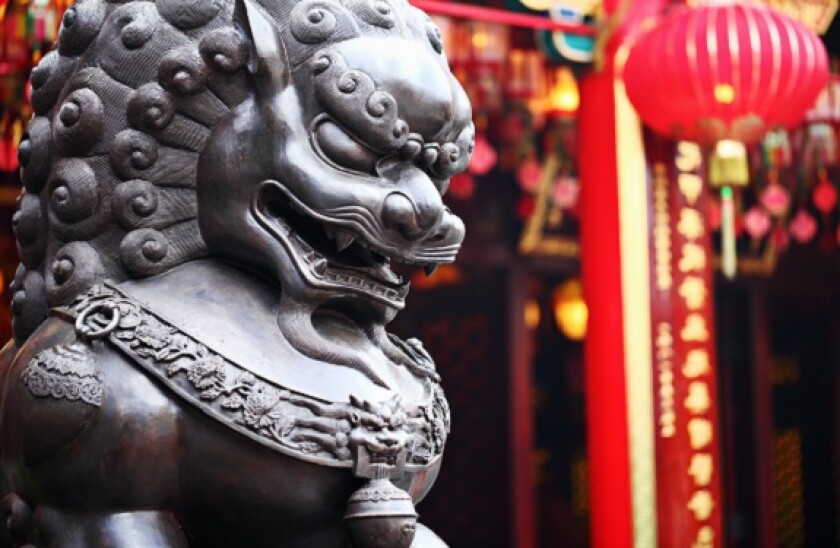The People’s Bank of China (PBoC) and the China Banking and Insurance Regulatory Commission (CBIRC) are taking public feedback on new regulations to make sure the country’s global systemically important banks (G-Sibs) meet certain capital adequacy targets from 2025.
Under the draft rules, starting January 1, 2025, G-Sibs are required to have a total loss-absorbing capacity (TLAC) of at least 16% of risk-weighted assets, with a minimum 6% of TLAC leverage ratio. The ratios must rise to 18% and 6.75% or above, respectively, from January 2028.
The ‘big four’ Chinese banks — Agricultural Bank of China, Bank of China, China Construction Bank and Industrial and Commercial Bank of China — are currently G-Sibs. Banks that are considered a G-Sib after January 2022 will be given three years to comply with the requirements, according to the new rules.
*
China’s official manufacturing Purchasing Managers’ Index (PMI) came at 51.5 for September, beating consensus forecast of 51.3. The PMI reading was 51 for the previous month. The official non-manufacturing PMI jumped to 55.9 last month from August’s 55.2.
The September Caixin manufacturing PMI was 53, below the previous reading of 53.1.
*
The International Monetary Fund published quarterly data on September 30 on the currency composition of official foreign exchange reserves. Holdings in renminbi increased for the sixth consecutive quarter to reach $230.4bn by the end of June. The amount stood at $220.1bn at the end of the previous quarter.
*
China’s banking sector recorded external financial assets of $1.241tr by the end of June, with external liabilities of $1.367tr, according to the State Administration of Foreign Exchange (Safe). Net liabilities stood at $126.4bn, with $337.3bn of net renminbi liabilities and $210.9bn of net foreign currency assets, Safe data showed.
*
The CBIRC plans to increase regulatory oversight of China’s online insurance sector.
Draft rules released last week said that online insurance business operators should be insurance institutions, but internet companies can apply for a licence. Unlicensed institutions and individuals will be banned from activities such as providing consultancy services on insurance products or insurance quotations.
*
The Interbank Market Clearing House Co will waive fees to register for all bond issuance, and halve that for interest payments and principal repayments for one year starting October 1.
*
The National Association of Financial Market Institutional Investors (Nafmii) published measures for easier Panda bond sales for some companies, on September 30. The rules are applicable to non-financial corporations registered outside of Mainland China.
The regulator said companies that fall under its ‘mature’ tier can register once for different types of products — such as short-term commercial paper, medium-term notes and asset-backed notes — in the interbank bond market without a pre-set quota. Companies considered to be in the ‘basic’ tier will still have to register for different products separately.
‘Mature’ companies are required to have minimum Rmb100bn-equivalent in assets and listed on a major foreign stock exchange. They must have raised at least Rmb10bn from bonds globally and have no defaults within the past 36 months.
In addition, Panda issuers can appoint a maximum of four — instead of two — underwriters at the registration stage. All four underwriters can appear on a single deal that is more than Rmb5bn in size. Three of them can work on deals between Rmb3bn and Rmb5bn, and only two for transactions under Rmb3bn.
*
Between January and August, private enterprises in China sold nearly Rmb350bn of corporate bonds in the interbank market, recording a 64% annual increase, according to data from the PBoC. In the exchange market, volume rose 23% to Rmb246.9bn.
*
Economists who attended a quarterly meeting by the Securities Association of China (SAC) proposed to implement a registration-based IPO system across the whole A-share market, said a press release by the SAC. They stressed the role of professional institutional investors during IPO pricing, urging regulators to learn from developed markets and introduce cornerstone investors to deals.
*
Five of China’s provinces and municipalities — Guangdong, Jiangsu, Zhejiang, Shanghai and Shandong — accounted for 68.9% of the country’s total export volume, or $1.083tr, for the January-August period, according to the National Development and Reform Commission.
Exports from Guangdong, Jiangsu and Shanghai dropped 5.7%, 5.8% and 1.7% year-on-year, respectively, for the period, while Zhejiang and Shandong saw an increase of 2.8% and 2.7%, respectively.
*
Semiconductor Manufacturing International Corp (SMIC) confirmed on Sunday that it has been hit by US sanctions. SMIC said in a Hong Kong filing that further export restrictions will be imposed on the supply of some US equipment, accessories and raw materials to the company.
An earlier report from Reuters at the end of September said the tightened restrictions were based on “unacceptable risk” that equipment supplied to SMIC could be used for military purposes. The company has since clarified that it “provides services solely for civilian and commercial end-users and end-uses” with no relationship with the Chinese military.
*
China is preparing to launch an antitrust probe against Google, Reuters reported, citing two anonymous sources.
Huawei Technologies proposed the case last year, said the report, which is being reviewed by the State Council’s antitrust committee. A decision on whether to proceed with a formal investigation could come as soon as October, although it could be affected by the state of the China-US relationship, said Reuters.
*
China Everbright Securities (HK) has been fined HK$2.5m by the Securities and Futures Commission. This is for pledging its clients’ securities with banks for financial accommodation without valid authorisation, according to an announcement from the Hong Kong regulator.
*
Ant Bank has officially started its operations in Hong Kong. The lender is the virtual banking arm of Ant Group, and will partner with AlipayHK, a mobile payment app. Users of AlipayHK will be able to open an Ant Bank account easily, while the banks’ customers can link their accounts to the e-payment app.

